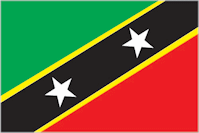Saint Kitts & Nevis -Corruption
 Small Caribbean nations are expected to deal - singlehandedly - with the double misfortune of being located between regions of massive drug production and regions of massive drug consumption. Small arms and light weapons always follow illegal drugs, and micro-states in the Caribbean are simply not equipped to deal with the externally created crime fallout.
Small Caribbean nations are expected to deal - singlehandedly - with the double misfortune of being located between regions of massive drug production and regions of massive drug consumption. Small arms and light weapons always follow illegal drugs, and micro-states in the Caribbean are simply not equipped to deal with the externally created crime fallout.
The media and many private citizens reported that government corruption was a problem. In particular, private citizens continued to express concern about the lack of financial oversight of both the Sugar Industry Diversification Foundation (SIDF) and the Citizenship by Investment Program (CIP). The government inherited a depleted SIDF from the previous government and continued to reform both programs during the year. The government also continued its audit of the SIDF and vacated the appointments of the SIDF committee. The government did not release publicly the number of passports issued and the nationalities of the holders of these passports under the CIP. The government did not publicly release details regarding the operations of the SIDF and CIP.
St. Kitts and Nevis (SKN) is a federation composed of two islands in the Eastern Caribbean. Its economy is heavily reliant on tourism, construction, and the offshore financial sector. SKN remains a transit point for drug traffickers going to the United States and Europe. SKN remains susceptible to corruption and money laundering because of the high volume of narcotics trafficking around the islands. The growth of its offshore sector coupled with unusually strong bank secrecy laws also remains problematic.
SKN derives a significant portion of its revenue from its program offering citizenship through investment (CIP); however, this programís prior lax vetting created AML and security vulnerabilities domestically and internationally. Despite recent efforts to improve the application process and vetting procedures, the CIP continues to be afflicted by significant deficiencies in vetting candidates and conducting due diligence on passport and citizenship recipients after they receive citizenship. An individual is eligible for economic citizenship with a $400,000 minimum investment in real estate. Also, an applicant is eligible by making a contribution ranging from $250,000 to $356,000 (based on an application for two adults and two dependents) to the Sugar Industry Diversification Foundation, a special project approved for the purpose of citizenship by investment. Applicants must make a source of funds declaration and provide evidence supporting the declaration. The Ministry of Finance has established a Citizenship Processing Unit to manage the screening and application process.
The anti-money laundering [AML] legislation is at the federation level and covers both St. Kitts and Nevis. Each island has the authority to organize its own financial structure and procedures. St. Kitts has acts governing companies, limited partnerships, foundations, and trusts that are registered in St. Kitts, while Nevis has Ordinances that govern corporations, limited liability companies, trusts, and multiform foundations. Most of the offshore financial activity is concentrated in Nevis.
The law provides criminal penalties for official corruption, and the government generally implemented these laws effectively. Private citizens and the media often cite corruption as a concern, particularly with regards to management of the Citizenship by Investment Program and the Sugar Industry Diversification Fund. The U.S. Department of Treasuryís Financial Crimes Enforcement Network (FINCEN) issued an advisory in May 2014 regarding abuse of the Citizenship by Investment Program by foreign criminals. St. Kitts and Nevis is party to the Inter-American Convention against Corruption.
Government agencies involved in enforcement of anti-corruption laws include the Royal St. Kitts and Nevis Police Force, the Director of Public Prosecutions, and the Financial Intelligence Unit. Parliament reviewed the Integrity in Public Life Bill in September 2013, but the law never passed. The government amended the Bill and will review the newly revised Bill in 2017. The Financial Intelligence Unit investigates financial crimes, but no independent body was established to handle allegations of government corruption.
In June 2015, twelve Commonwealth Caribbean countries, including St. Kitts and Nevis, established a new regional body to enhance transparency and to help fight corruption. The formation of the Association of Integrity Commissions and Anti-Corruption Bodies in the Commonwealth Caribbean was announced as a major step forward in regional efforts to support integrity and address corruption. It is hoped that the new body will help to further strengthen public confidence in cross-border initiatives to enhance accountability, knowledge sharing and coordination.
|
NEWSLETTER
|
| Join the GlobalSecurity.org mailing list |
|
|
|

